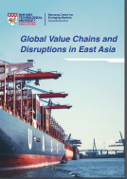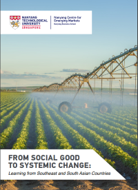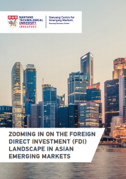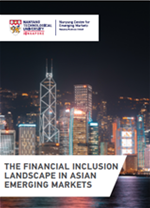Issue Reports

Global Value Chains and Disruptions in East Asia
The concept of global value chain (GVC) emphasizes the global scale and structure of many value chains as a result of the internationalization of production. GVCs have been critical for development and jobs in many countries particularly in emerging markets. The Nanyang Centre for Emerging Markets (CEM) takes stock of current trends in GVCs and examines how recent international developments may impact GVC and ultimately emerging markets’ growth.
This issue report surveys the dynamics of GVCs in the East Asian region over the last two decades, based on available data on value-added trade. It presents insights into emerging patterns of production relocations that follow from the recent US-China trade war and comments briefly on the potential impacts of the COVID-19 pandemic on global value chains.

From Social Good to Systemic Change: Learning from Southeast and South Asian Countries
The Creating Shared Value (CSV) is defined as value created by and for a company as well as its stakeholders simultaneously. The CSV concept constitutes a significant step forward in business responsibility as it views both a firm’s performance and social concerns from the value creation perspective, a phenomenon that constitutes a central point in economics and management.
The report here proposes an “Impact-System-Strategy” analytical process. This process enables companies to scale the social impact of their business activities. This report encourages resource providers and policymakers to apply our findings to empower businesses as a force for addressing pervasive social issues.

Zooming in on the Foreign Direct Investment Landscape in Asian Emerging Markets
Foreign direct investment inflows, an integral component of Asia’s strong economic performance over the last few decades, also facilitated the spread of regional production networks. Multinational enterprises play a pivotal role in the development of many emerging markets. This report explores the location and sectoral FDI in Asia. This report adds insights on the evolution of motives for shifts in greenfield FDI inflows into each country of the region. This report further provides a succinct scanning of the region’s regulatory environments.

Business sustainability integrates a broad set of business concepts and practices that a company uses to address social challenges beyond making profits. It includes a variety of organisations ranging from purpose-driven businesses that align profits with societal impact as long-term sources of competitive advantage to social enterprises that adopt a business model to solve social problems. Every company that practices business sustainability pursues dual goals— both the social goal and the business goal.

The Financial Inclusion Landscape in Asian Emerging Markets
Achieving greater financial inclusion remains a key policy priority for several emerging market and developing economies (EMDEs). Greater financial inclusion is poised to help achieve several of the Sustainable Development Goals (SDGs) set by the United Nations. An inclusive financial system is desirable for many reasons. Inclusiveness enhances economic efficiency and welfare by enabling large segments of the population to adopt safe and secure saving practices.














/enri-thumbnails/careeropportunities1f0caf1c-a12d-479c-be7c-3c04e085c617.tmb-mega-menu.jpg?Culture=en&sfvrsn=d7261e3b_1)

/cradle-thumbnails/research-capabilities1516d0ba63aa44f0b4ee77a8c05263b2.tmb-mega-menu.jpg?Culture=en&sfvrsn=1bc94f8_1)

7e6fdc03-9018-4d08-9a98-8a21acbc37ba.tmb-mega-menu.jpg?Culture=en&sfvrsn=7deaf618_1)
